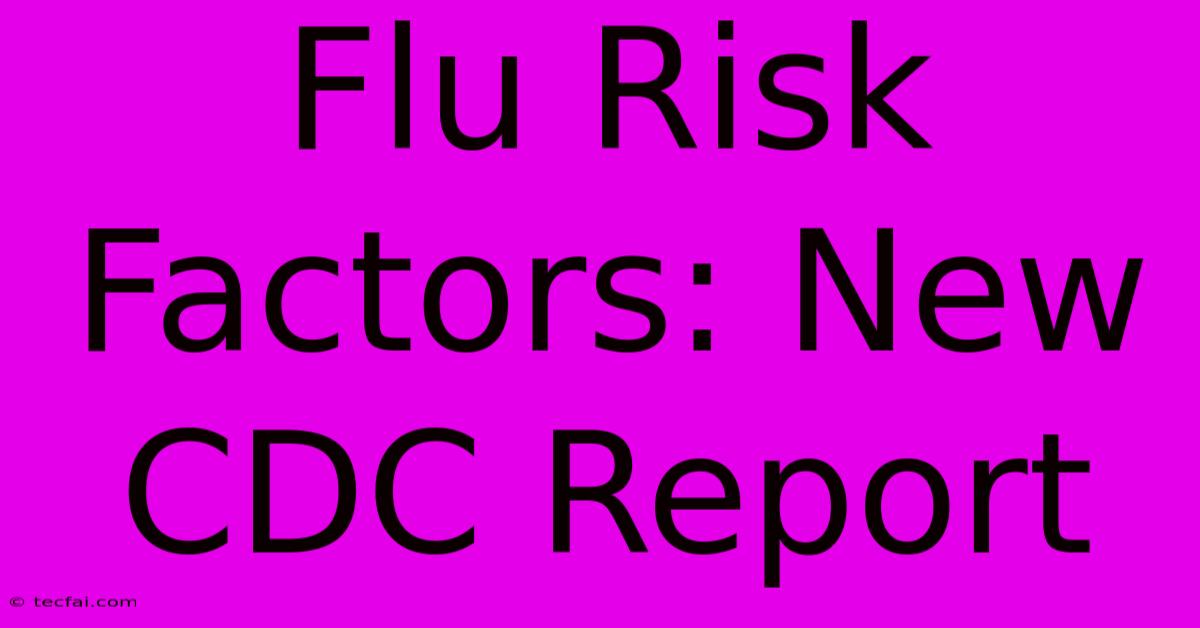Flu Risk Factors: New CDC Report

Discover more detailed and exciting information on our website. Click the link below to start your adventure: Visit Best Website tecfai.com. Don't miss out!
Table of Contents
Flu Risk Factors: New CDC Report Highlights Vulnerable Populations
The Centers for Disease Control and Prevention (CDC) recently released updated information on influenza, highlighting key risk factors for severe illness. Understanding these factors is crucial for individuals and communities to take proactive steps to protect themselves during flu season. This article delves into the latest CDC report, examining the populations most vulnerable to the flu and offering practical strategies for mitigation.
Who is at Highest Risk for Severe Flu?
The CDC consistently emphasizes that certain groups face a significantly higher risk of developing serious complications from the flu, including hospitalization or even death. These high-risk individuals often require more aggressive preventative measures. The latest report reinforces the following risk factors:
- Young Children (under 5 years old): Their immune systems are still developing, making them particularly susceptible to severe flu infections.
- Older Adults (65 years and older): As we age, our immune systems weaken, increasing vulnerability to the virus and its complications, such as pneumonia.
- Pregnant Individuals: Pregnancy alters the immune system, making pregnant women more prone to severe flu and complications. The risk extends to the baby as well.
- Residents of Nursing Homes and Long-Term Care Facilities: These settings are often breeding grounds for infectious diseases due to close proximity and shared living spaces.
- Individuals with Chronic Health Conditions: People with conditions like asthma, heart disease, diabetes, kidney disease, neurological conditions, weakened immune systems (due to HIV, cancer treatments, etc.), and chronic lung disease are at significantly elevated risk.
- American Indians/Alaska Natives: Studies consistently show disproportionately higher rates of influenza-related complications within these communities.
- People with Obesity: Obesity is increasingly recognized as a significant risk factor for severe influenza.
Understanding the Severity of Flu Complications
It's important to understand that the flu isn't just a "bad cold." While many experience mild symptoms, others can develop serious complications such as:
- Pneumonia: A lung infection that can be life-threatening.
- Bronchitis: Inflammation of the bronchial tubes.
- Ear infections: Particularly common in children.
- Dehydration: From fever and vomiting.
- Worsening of chronic health conditions: The flu can exacerbate existing health problems.
- Bacterial infections: Secondary bacterial infections can occur following a viral flu infection.
Protective Measures: What You Can Do
The CDC strongly recommends several key strategies to mitigate flu risk, especially for those in high-risk groups:
- Annual Flu Vaccination: This remains the single most effective way to protect against the flu and its complications. Even if the vaccine doesn't perfectly match the circulating strains, it offers substantial protection.
- Good Hygiene Practices: Frequent handwashing, covering coughs and sneezes, and avoiding close contact with sick individuals are essential.
- Staying Home When Sick: This prevents the spread of the virus to others.
- Antiviral Medications: These can be prescribed by a doctor to treat the flu and reduce its severity, particularly for those at high risk. Early treatment is key.
- Consult Your Doctor: If you experience flu-like symptoms, especially if you are in a high-risk group, seek medical attention promptly.
The Importance of Community-Level Prevention
The fight against influenza is not solely an individual responsibility; it's a community effort. Collective action, including widespread vaccination efforts and public health initiatives, plays a crucial role in reducing the burden of the flu. Understanding the risk factors highlighted in the latest CDC report allows for better targeting of preventative measures and ultimately contributes to a healthier community.
This information is for educational purposes only and should not be considered medical advice. Always consult with a healthcare professional for any health concerns or before making any decisions related to your health or treatment.

Thank you for visiting our website wich cover about Flu Risk Factors: New CDC Report. We hope the information provided has been useful to you. Feel free to contact us if you have any questions or need further assistance. See you next time and dont miss to bookmark.
Featured Posts
-
Clippers Vs Celtics Free Live Stream
Nov 26, 2024
-
Medway Surgery Chess Eases Teens Fears
Nov 26, 2024
-
Champions League Team News And Fantasy
Nov 26, 2024
-
Panoorin Timberwolves Vs Celtics Game
Nov 26, 2024
-
Panuorin Ang Wizards Vs Pacers Gabay
Nov 26, 2024
